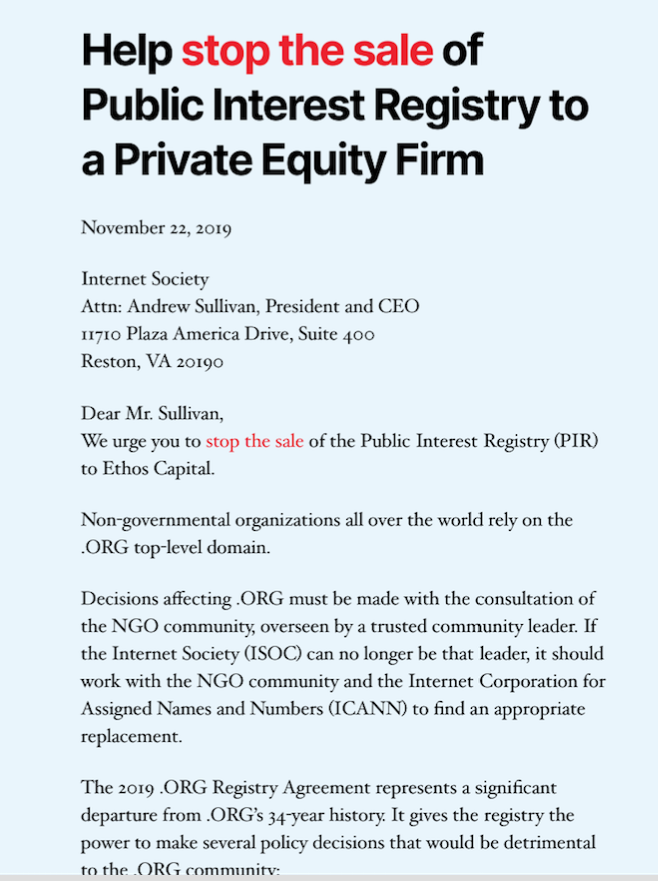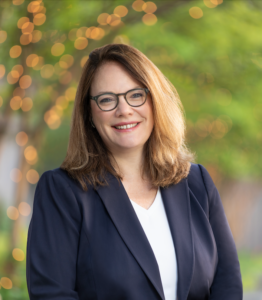More than 600 nonprofit signatories have jumped onto a letter and website urging blockage of the sale of the Public Interest Registry (PIR) to a private equity firm.
PIR is responsible for .ORG assignment and preservation of those domains. It was announced on Nov. 13 that the Internet Society and PIR reached an agreement with Ethos Capital, an investment firm, for Ethos Capital to acquire PIR and all of its assets from the Internet Society.
The announcement read, in part, “As a mission-driven firm focused on the guiding values and ideals that build successful organizations and communities, Ethos Capital is committed to ensuring complete continuity of PIR’s operations, to maintaining the strong community relationships PIR has established over the years, and to continuing PIR’s longstanding partnerships and vendor affiliations to ensure domain operations run smoothly, without disruption to the .ORG Community or other generic top-level domains operated by the organization.”
A call to Ethos Capital was not returned. LinkedIn shows the organization as being in Boston. The telephone number on the Ethos Capital website has a New York City exchange and the person picking up the telephone said she was in California. The phone was answered not as Ethos Capital but as “Erik Brooks’ line.” Brooks is listed as founder and CEO of Ethos Capital.
In a posting on the website Medium, Jacob Malthouse, co-founder of the .eco domain and former ICANN staffer, wrote that “the sale occurred shortly after ICANN removed .org price caps. Given the scale of this transaction, the links between Ethos, the domain industry, .org and their impacts on the nonprofit community are deep and worth exploring.”
Malthouse continued: “To give you an idea of scale, the .org annual report puts their revenues at $90 million, but there are now no restrictions on doubling that fee. Domain Name Wire claims that the .org domain could bring in as much as $180 million dollars a year.“
Ethos is only one of the investors. Malthouse cited an email alleged to be from Internet Society CEO Andrew Sullivan listing Perot Holdings, FMR LLC and Solamere Capital also as parties to the deal.
In a letter sent to The Internet Society posted to savedotorg.org, the leaders wrote that decisions “affecting .ORG must be made with the consultation of the NGO community, overseen by a trusted community leader. If the Internet Society (ISOC) can no longer be that leader, it should work with the NGO community and the Internet Corporation for Assigned Names and Numbers (ICANN) to find an appropriate replacement.”
The letter’s authors wrote that the “2019 .ORG Registry Agreement represents a significant departure from .ORG’s 34-year history.” It gives the registry, according to the authors, the power to make several policy decisions that would be detrimental to the .ORG community: The power to raise registration fees without the approval of ICANN or the .ORG community. A .ORG price hike would put many cash-strapped NGOs in the difficult position of either paying the increased fees or losing the legitimacy and brand recognition of a .ORG domain; the power to develop and implement Rights Protection Mechanisms unilaterally, without consulting the .ORG community. If such mechanisms are not carefully crafted in collaboration with the NGO community, they risk censoring completely legal nonprofit activities; and, the power to implement processes to suspend domain names based on accusations of “activity contrary to applicable law.” The .ORG registry should not implement such processes without understanding how state actors frequently target NGOs with allegations of illegal activity, according to the authors.
There were 27 original signers of the letter, including NTEN, TechSoup, the National Council of Nonprofits, The YMCA, The YWCA, Volunteers of America and ASAE, the Center for Association Management.
“The sale of PIR to a private equity firm, and the stated likelihood of changing PIR to a B Corp, undermines the basis of the 2002 original agreement for PIR to manage the .org domain,” said Amy Sample Ward, chief executive officer of technology nonprofit NTEN in Portland, Ore. “It is impossible to believe that nonprofits — especially small and non-U.S. nonprofits — would be centered in any decision making, pricing, or investments by PIR once it is outside of the nonprofit structure and no longer managed by a nonprofit with a stated mission ‘to promote the open development, evolution and use of the Internet for the benefit of all people throughout the world.’”
She said: “ICANN is able to stop the sale and needs to intervene immediately.”
The National Council of Nonprofits submitted comments to ICANN in the lead-up to the sale announcement. The organization’s leaders articulated strong opposition to the lifting of the price-hike cap. “The proposal would subject nonprofits to unpredictable and unrestricted price hikes,” said Rick Cohen of the NCN. “Unlike for-profit businesses, nonprofits typically do not have revenue flexibility to absorb new and unexpected costs or to raise prices on consumers to overcome the hit to their bottom lines.”











